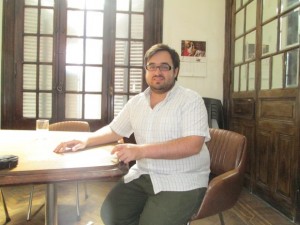Sustainable tourism vendors in Buenos Aires get grades

But when Juan José Galeano took the idea to hoteliers in Buenos Aires and told them that not only was it healthier but that it would also save energy and money because many of their guests wouldn't bother to lower the temperature, he was met by wonder.
"They look at you like you discovered gunpowder," says Galeano, 27.
Galeano is a founder of the Responsible Tourism Network (RTR, for its initials in Spanish), a Buenos Aires group of hotels, travel agents, NGOs and government organizations launched in 2008 to connect responsible (sustainable) hotels and agencies with like-minded tourists. There is plenty motive to do so: A 2011 Nielsen survey found that 49 percent of Latin American consumers were willing to pay more for products and services from companies that gave back to society, while a 2012 TripAdvisor survey found that half of all travelers would pay more to stay at eco-friendly accommodations. But while the RTR is one of many organizations designed to ride the eco-consumer wave, how it is designed and run sets it apart from most other groups of its ilk.

When the first ten members set up the group four years ago, they were forced to deal with a very elemental question: "The great problem that arose was with what criteria would we identify responsible hotels, and who would define those criteria?" Galeano says.
Typically a government agency or NGO certifies that tourism businesses meet their criteria and then presents them with a seal of approval. The Costa Rica Board of Tourism offers a certificate in that country, for example, while the Rainforest Alliance offers a verification sticker to businesses that meet its requirements. The RTR's founding members decided to break with this scheme, however. Instead of unilaterally defining requirements and presenting certificates to those who complied with them, the organization's government, NGO and industry members voted on a set of indicators, and then presented members with report cards that showed where vendors met or missed each indicator, along with an overall score on a 1-to-100 scale. Members improve their grade by complying with more indicators before their annual February audit, and each year they vote on updating the indicators (there are now 54).
"We are against the idea of putting out a seal that says, 'I am a good hotel.' What does that tell you? We don't have members who are perfect. Not at all. They’re aiming at improving," says Galeano, who claims that the RTR methodology is unique in the world.
This process creates a set of indicators that evolves with current technology and techniques, and it provides tourists with specific information about the aspects of sustainability and responsibility where their hotel is strongest. The 54 indicators run from setting air conditioning at 75 degrees and heat at 71 degrees to separating garbage, keeping a profit margin of no more than 15 percent, and using Class A (low energy-consumption) refrigerators.
According to Galeano, most new members come in with a grade of around 50 percent, and then jump to some 70 percent the second year after they comply with low-hanging fruit like raising air-conditioner temperature and installing low energy-consumption lightbulbs. Later, they improve by three to five percent a year as they work on more difficult and expensive indicators, like installing wheelchair ramps, reusing graywater and shifting their revenue from profits to employees and suppliers.
Today, the highest-rated lodge, with a grade of 78 percent, is Home Hotel, a high-end boutique hotel in the leafy bohemian neighborhood of Palermo Hollywood. According to co-owner Patricia O'Shea, the attraction of RTR was that it worked with members on improving practices.
"They help you audit your business yearly so you can put very specific targets for the following year and see how you're meeting them. For me, it's very good to quantify and to get someone else to say where you are in the responsible tourism guidelines. It helps us focus," she says.
O'Shea says she was also attracted to RTR because it wasn't just a place for self defined eco-lodges and hippy outposts.
"We're not called EcoHome, because we're not. We're a trendy hotel that happens to be run in an eco manner," she says.
Home works with a recycling cooperative, buys meat and other supplies locally, gives away used towels and sheets, outfits guest rooms with large shampoo dispenser bottles instead of individual ones, and sets aside used oil for bio-diesel. It sets its air conditioners at 75 degrees (which O'Shea says she learned from RTR) and has been installing more LED lights, leading to a 20 percent drop in its electrical bill between 2011 and 2012.
Perhaps ironically, considering the reasons for its founding, while the RTR can say it has helped to make tourism in Argentina more sustainable, it cannot yet claim to have generated a lot of business for its members by sending them like-minded tourists. "There is very little measurement in our hotels of how the tourists get there," says Galeano.
O'Shea agrees. "I think people like it and are surprised. I think they approve of it," she says of her RTR grade. "But I'm not sure we get chosen because of it."
Since inception, RTR has grown to some 50 members -- about 30 are hotels and agencies and the rest are government and NGOs. It is currently expanding into Uruguay.
Photo of terrace garden from Eco Pampa Hostel; Photo of Galeano by Ian Mount; Photo of shampoo from Home Hotel.
This post was originally published on Smartplanet.com
